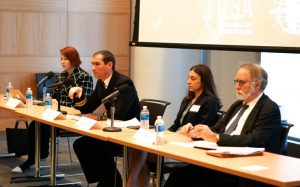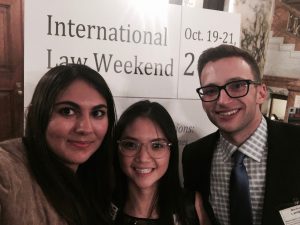By: Nicholas Lamparski

From left: Lesley Benn, Executive Director of ILSA; Lt. Cdr. Peter Barker, Law of Coalition of Warfare, Stockton Center for the Study of International Law; Jennifer Permesly, Counsel, International Litigation and Arbitration, Skadden, Arps, Slate, Meagher & Flom LLP; John Burroughs, Executive Director of the Lawyers Committee on Nuclear Policy, Director of the UN Office of the International Association of Lawyers Against Nuclear Arms
The Philip C. Jessup International Law Moot Court Competition, the world’s largest simulated court competition, tackles the question of how international disputes can be resolved in the courtroom rather than on the battlefield. In Jessup, law students from around the world compete against one another in national competitions. Eventually, a select few advance to the world championship in Washington, D.C. The students’ hard work is put to the test, as they are grilled by volunteer judges from around the world, including sitting judges from the International Court of Justice, and we see these students overcome pressure and personal challenges to persevere in the competition.
From October 19-21, 2017, I had the opportunity to attend International Law Weekend, at the 96th annual meeting of the American Branch of the International Law Association. As a member of the Philip C. Jessup International Law Moot Court Team at Washington University School of Law, my attendance at the 2018 Jessup Problem Panel was of utmost importance. There, a group of experts discussed some of the key topics of the 2018 Jessup problem, which include the validity of interstate arbitral awards, the capture of a marine vessel, the breach of nuclear disarmament obligations, and the conduct of naval warfare.
One of the experts at the Jessup panel was Lieutenant Commander Peter Barker. He is an expert on the conduct of naval warfare, and I found his discussion particularly enlightening; specifically in terms of confronting the naval warfare issues in this year’s Jessup problem. Lieutenant Commander Barker mentioned that some of the naval warfare issues in the Jessup problem are live issues which are actively being considered by war commanders throughout the world.

From left: Washington University law students Léa Garriga-Lafabregue, Jessup Moot Court Team Members Qing (Rose) Lyu and Nicholas Lamparski
As law students competing in this competition, Lieutenant Commander Barker and the other panelists helped me realize that we are not only developing fantastic skill sets that will serve us and our clients well, but we are also providing leading experts in this field with a distinct perspective to assist them as they grapple with these critical issues in the real world. Ultimately, we strive to ensure conflicts remain in the courtroom instead of on the battlefield.
